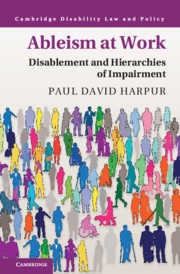Book contents
- Ableism at Work
- Cambridge Disability Law and Policy Series
- Ableism at Work
- Copyright page
- Contents
- Foreword
- Acknowledgements
- 1 Introduction
- 2 International Disability Norms at Work
- 3 The CRPD Committee, Ableism and Hierarchies of Impairment at Work
- 4 Hierarchies of Impairment at Work in the Regulation and Response to Sheltered Work
- 5 The Arbitrary Exclusion of Episodic and Psychosocial Disabilities from Legal Protection
- 6 Ability Apartheid at Work
- 7 Reasonable Accommodations in a Psychosocial Diverse Workplace
- 8 Using Occupational Safety and Health Laws to Promote Psychological Health at Work
- 9 Sanism and Ableism in the Law’s Response to Injured Workers
- 10 Advancing Psychosocial Diversity Using Contract and Unfair Dismissal Laws
- Index
7 - Reasonable Accommodations in a Psychosocial Diverse Workplace
Hierarchies of Impairment at Work
Published online by Cambridge University Press: 06 August 2020
- Ableism at Work
- Cambridge Disability Law and Policy Series
- Ableism at Work
- Copyright page
- Contents
- Foreword
- Acknowledgements
- 1 Introduction
- 2 International Disability Norms at Work
- 3 The CRPD Committee, Ableism and Hierarchies of Impairment at Work
- 4 Hierarchies of Impairment at Work in the Regulation and Response to Sheltered Work
- 5 The Arbitrary Exclusion of Episodic and Psychosocial Disabilities from Legal Protection
- 6 Ability Apartheid at Work
- 7 Reasonable Accommodations in a Psychosocial Diverse Workplace
- 8 Using Occupational Safety and Health Laws to Promote Psychological Health at Work
- 9 Sanism and Ableism in the Law’s Response to Injured Workers
- 10 Advancing Psychosocial Diversity Using Contract and Unfair Dismissal Laws
- Index
Summary
When workplaces are designed and managed for a worker with a 'normal' range of abilities, then workers with different abilities are disabled at work. Human rights and anti-discrimination laws create duties upon employers and others to adjust workplaces to accommodate workers with disabilities. This chapter argues that reasonable accommodation and adjustment laws privilege workers with physical and sensory impairments compared to workers who have psychosocial disabilities. Workers with invisible psychosocial disabilities are victimised if they disclose their disability and the law is comparatively less likely to recognise the request of a worker with a psychosocial disability as reasonable. The failure by law and work practices to address ableism at work perpetuates a hierarchy of impairments, which leaves workers with psychosocial disabilities unable to exercise their right to work on an equal basis as workers without disabilities, or with less stigmatised impairments.
Keywords
- Type
- Chapter
- Information
- Ableism at WorkDisablement and Hierarchies of Impairment, pp. 122 - 152Publisher: Cambridge University PressPrint publication year: 2019

